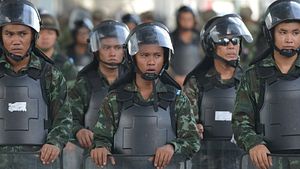As expected, Thailand’s political rights rating changed from “partly free” in 2014 to “not free” in the Freedom in the World 2015 report released by democracy watchdog Freedom House. Thailand’s army launched a coup last year that led to the imposition of martial law in the country. The army also suspended the constitution, detained political leaders, controlled the media, and banned public protests.
The report is another troubling reminder of the worsening political situation in Thailand.
The army claimed the coup was necessary to restore stability by ending the intense clashes of various political forces. Indeed, the army dispersed the street protests but the political crisis is far from resolved. The junta merely hid the symptoms of the crisis by punishing anyone who dared to speak out against the government. Order was enforced by eroding the political rights of ordinary citizens.
The junta’s brutal policies are highlighted in an infographic published by independent news portal Prachatai. The image features some of the normal activities that have been suppressed by the government over the past nine months. Those who conducted these peaceful actions were arrested for allegedly undermining national security. The list below, culled from the infographic, reflects the paranoia of the junta leaders on one hand, and the suffering experienced by ordinary Thais on the other:
1. Holding a blank A4 paper or A4 paper with anti-coup messages
2. Covering one’s face, eyes, and mouth
3. Helping arrested protesters
4. Holding “Peace Please” T-shirt
5. Imitating the Hunger Games three-fingered salute
6. Gathering at McDonald’s
7. Reading George Orwell’s 1984 novel
8. Eating sandwiches in public
9. Playing the French national anthem
10. Wearing a Red Shirt while selling crispy fried squid
11. Issuing a statement denouncing the coup
12. Wearing “people” mask
13. Wearing “respect my vote” t-shirt
14. Approaching or being approached by journalists
15. Running for democracy
16. Holding placards that read “holding placards is not a crime”
17. Posting a photo with anti-junta and “No Martial Law” messages on Facebook
18. Holding academic seminars on the political situation
19. Gathering people to watch the premiere of Hunger Games 3
20. Distributing leaflets featuring a poem about democracy
21. Giving three-fingered salutes to Prayuth, the leader of the junta
22. Selling fruit products with (former Prime Minister) Thaksin Shinawatra’s square face logo
The list confirms the accuracy of the report by Freedom House. If simple activities like reading books and watching movies are considered a threat to the national security, how can Thais effectively exercise and assert their political rights?
But the junta seems impervious to international criticism. In recent weeks, the army has been aggressive in silencing dissent. A land rights activist was detained, an opposition leader was visited at his home by an army officer to undergo an “attitude adjustment” session, and a civil society seminar on Internet legislation was interrupted by the presence and surprise participation of soldiers at the meeting.
The junta is also readying the passage of 10 digital economy bills which some activists say could violate the rights of Internet users and mobile phone subscribers in the country. These bills, if passed into law, could further gag the new media and the few remaining critical voices in Thai cyberspace.
These are challenging times for Thailand’s democracy and press freedom advocates. It is up to the international community to push for democratic political reforms in the country.
































